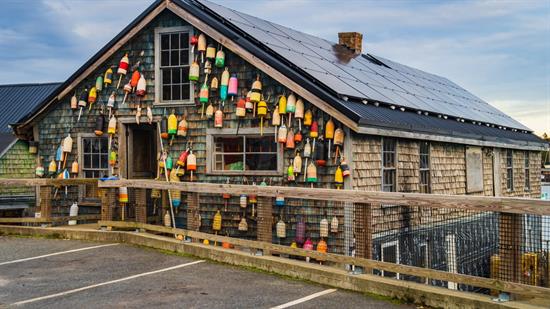Press Releases
Protect Billions in IRA Funds for Rural Clean Energy in Farm Bill, House Ag Dems Tell Committee Leadership
Washington,
November 30, 2023
Maine’s First District Congresswoman Chellie Pingree and all Democrats on the House Agriculture Committee today wrote to Chair Glenn “G.T.” Thompson (R-Pa.) and Ranking Member David Scott (D-Ga.) urging they ensure the billions of dollars passed in the historic Inflation Reduction Act (IRA) be used only for the intended purpose: to aid rural communities, businesses, and utilities in their clean energy transition. The Democratic lawmakers said, “Energy, and our ability to keep it reliable and affordable, is one of the most important inputs to keep costs down for our farmers, ranchers, and rural small businesses.” “The IRA represents the single largest investment in rural electrification since passage of the Rural Electrification Act in 1936 and makes enormous strides to incentivize rural and farming communities in their transition to clean energy,” the lawmakers wrote. “It is imperative we preserve and fully fund these programs, the Powering Affordable Clean Energy (PACE), Empowering Rural America (New ERA), and Rural Energy for America Program (REAP) at the USDA.” The full letter is available here and copied below. The IRA, championed by House Democrats and signed into law by President Biden in August 2022, represents the single largest investment in climate and clean energy solutions in American history. The IRA provides more than $10 billion to support USDA’s clean energy transition programs. In October, Pingree and House Democrats on the Agriculture Committee sent a similar letter to Committee leadership urging that the nearly $20 billion of conservation funding passed in the IRA be used only for its intended purpose in the upcoming Farm Bill. Pingree has been an organic farmer since the 1970s and is a recognized national policy leader on sustainable food and farming. As a member of both the House Agriculture Committee and House Appropriations Agriculture Subcommittee, Pingree continues to be a vocal advocate for agriculture and food policy reform. Because of her leadership, the 2018 Farm Bill more than doubled funding for organic research, created the first federal produce prescription program, and created the local agriculture market program with permanent federal funding. Pingree is the author of the Agriculture Resilience Act, comprehensive legislation that sets a bold vision of reaching net-zero greenhouse gas emissions in U.S. agriculture by the year 2040. In addition to the Agriculture Committee, Pingree is the Ranking Member of the Appropriations Interior, Environment, and Related Agencies Subcommittee, which she chaired in the 117th Congress. +++
Dear Chair Thompson and Ranking Member Scott, As you negotiate the 2023 Farm Bill, we write to express our strong support for using the full funding in billions of dollars provided by the Inflation Reduction Act (IRA) to aid rural communities, businesses, and utilities in their clean energy transition, as intended. The IRA represents the single largest investment in rural electrification since passage of the Rural Electrification Act in 1936 and makes enormous strides to incentivize rural and farming communities in their transition to clean energy. It is imperative we preserve and fully fund these programs, the Powering Affordable Clean Energy (PACE), Empowering Rural America (New ERA), and Rural Energy for America Program (REAP) at the USDA. In May, USDA introduced its guidance for the $1 billion PACE and the $9.7 billion New ERA programs. PACE is tailored to drive private renewable energy economic development in rural and tribal communities by offering forgivable low-cost loans to projects that serve or are owned by underserved rural communities. New ERA is a grant and loan program designed to help rural electric cooperatives make large scale investments in, and own, clean energy to reduce costs for their members. Both programs have been remarkably successful in generating broad support from rural electric cooperatives, renewable energy developers, and local governments. September 15th marked the deadline for initial applications to New ERA, and, in early October, USDA announced that it had received record demand for the program, with 750 proposals from rural electric cooperatives, worth more than $43 billion in requests to drive nearly $100 billion in rural clean energy investments. USDA received requests from nearly every state that hosts rural electric cooperatives, and Puerto Rico. Non-profit electric cooperatives have been vital to the quality of life in rural areas going back to the 1930s when they partnered with USDA to electrify rural America. However, as non-profits, they have fewer financial resources to support large infrastructure investments and projects. The New ERA program presents the opportunity for rural electric cooperatives and Rural Utility Service borrowers to transition their energy portfolio to more efficient, reliable, and affordable energy sources. At the end of September, USDA closed the initial application window for the PACE program. The agency received 803 project proposals to build clean energy assets in rural communities, worth $12 billion, clarifying the need for these types of public investments. USDA has already started asking PACE applicants for formal proposals and expects to reach out to New ERA finalists soon. Similarly, USDA is making record levels of grant, loan, and technical assistance awards for REAP. The surge in amount of grant funds requested, for example, is unprecedented, with a 1000% increase in Fiscal Year 2023, showing an interest and need heretofore never seen in over two decades of the program’s existence. As we continue to drive towards a bipartisan Farm Bill, we urge you to keep these USDA IRA initiatives intact. Energy, and our ability to keep it reliable and affordable, is one of the most important inputs to keep costs down for our farmers, ranchers, and rural small businesses. Thank you for your time and attention. Sincerely, ### |


